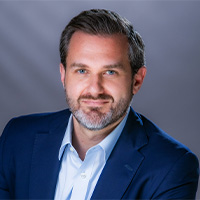On September 4, 2025, MindMed announced that JAMA has published full results from the company’s positive Phase 2b study of MM120 (lysergide D-tartrate, LSD) in 198 adults with moderate-to-severe GAD. This is the first randomized, placebo-controlled trial to evaluate a single treatment across four dose levels (25, 50, 100, or 200 µg) as a monotherapy and did not include any form of study-related psychotherapeutic intervention. Click here to learn more and read the full study here.
Targeting unmet need for approx. 26 million
Lack of ambition has been holding back development of treatments for brain health disorders, according to Rob Barrow. “Our field, in some ways, has been self-limiting to its own detriment, focusing on very narrow populations and thinking a little bit too small,” he says.
This, in turn, has fuelled Barrow and his company, MindMed to innovate for millions of Americans to address unmet patient needs. He aims to deliver for the approx. 26 million people in the U.S. alone with GAD or MDD, who could potentially benefit from MM120 ODT.
“To have the kind of meaningful impact that we aspire to have, it really takes an ambitious view of what we can accomplish,” Barrow says. That includes “being thoughtful about accessibility, about the dynamics for the delivery of the drug if we're ultimately able to get it approved, thinking about the sites of care and the types of providers that could be leveraged to deliver at that kind of scale.”
Barrow says many rival programs have limited their focus to the important but relatively small market for treatment-resistant depression. He also points to MindMed’s early decision to establish the drug’s stand-alone efficacy, while competitors focused on combination approaches using drugs and psychotherapy.
“To have the kind of meaningful impact that we aspire to have, it really takes an ambitious view of what we can accomplish,” Barrow says. That includes “being thoughtful about accessibility, about the dynamics for the delivery of the drug if we're ultimately able to get it approved, thinking about the sites of care and the types of providers that could be leveraged to deliver at that kind of scale.“
"We went from a position where we had no clinical data of our own to all of a sudden having some of the most compelling data in the field.”
Rob Barrow, CEO, MindMed
Data and regulatory breakthrough
After its “extraordinary promise” emerged in the mid-20th century, the psychedelic drug class was shelved for decades until the recent widespread revival of interest, including FDA guidance on use in clinical trials.
MindMed itself has gone through a similar resurgence. 2024 was a “transformational” year, Barrow says: “We went from a position where we had no clinical data of our own to all of a sudden having some of the most compelling data in the field.” That was capped with an FDA breakthrough designation for the MM120 program in GAD.
Having worked in psychedelics since 2018, Barrow says the FDA has shown a thoughtful approach throughout to emerging data from MindMed and the field in general.
Recent high-profile changes and uncertainties at the FDA have not affected the regulatory direction, he adds: “We have only seen continued enthusiasm, continued engagement, prompt responses, thoughtful, complete correspondence with the agency that's given us a high degree of conviction.”
MindMed currently has three pivotal Phase 3 trials under way to evaluate MM120, with readouts expected in 2026.
Financial momentum in tough times
The company is thriving at a volatile period for the industry, through a disciplined, nimble approach – with a headcount of approximately 80 employees, the company remains relatively small. “We've been very fortunate that the quality of the data and the kind of outcomes we've been able to achieve attracted some really high-quality investors in 2024,” Barrow says.
“We're in a strong position to continue to navigate what are choppy waters in this macro environment, and to be able to fund ourselves into 2027 and -at least 12 months beyond our first Phase 3 topline data readout for MM120 ODT in GAD.”
He also predicts strategic and M&A interest will continue to grow, both for MindMed itself and for the field, given the scale of unmet need in psychiatry.
This content was recorded at RBC's Global Healthcare Conference in New York on May 21 2025.

